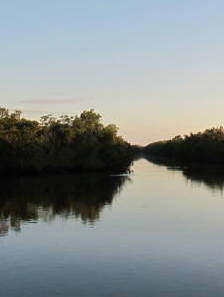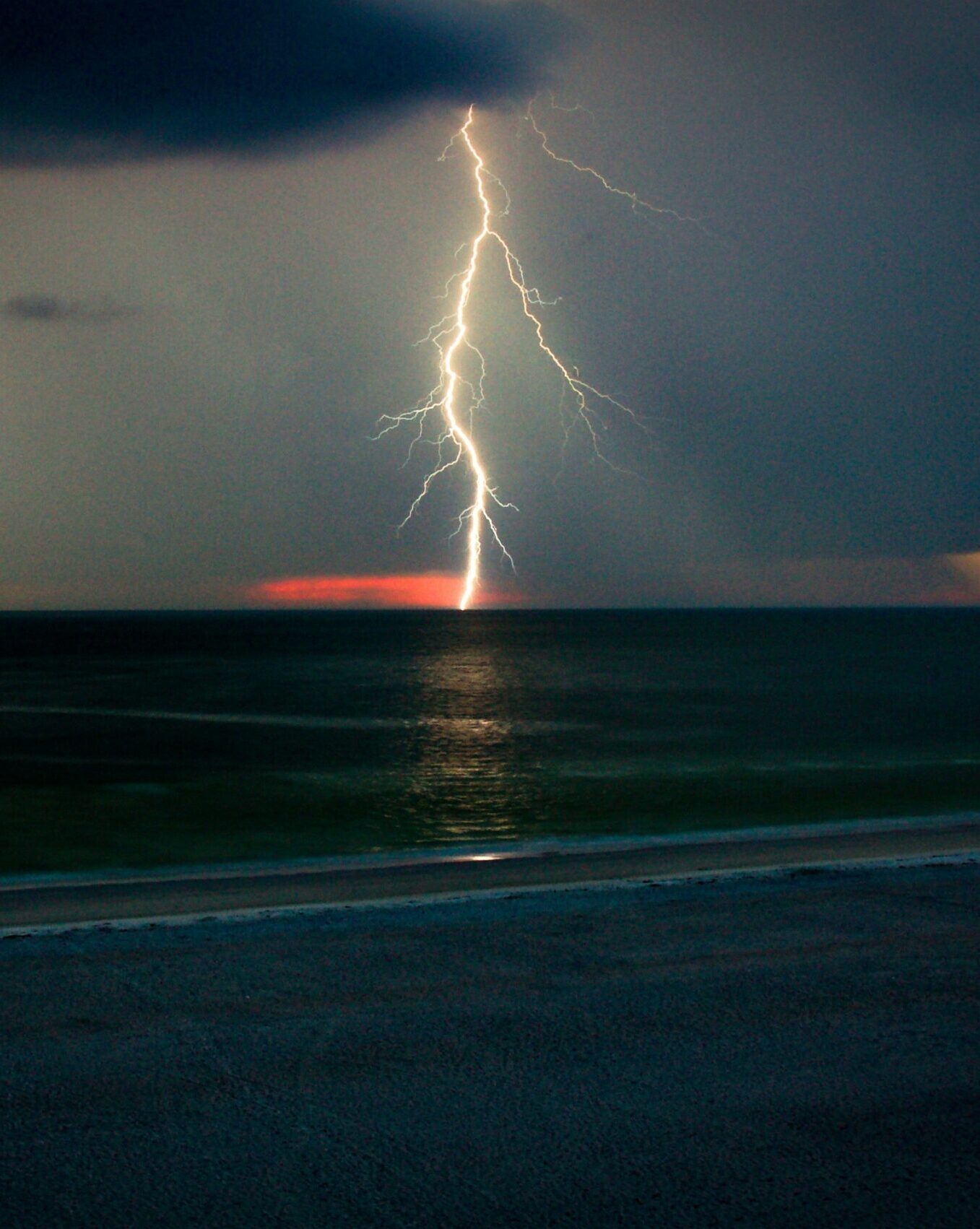We arrive at night, landing at West Palm International, still wearing jeans and fleece jackets as we step into the Florida night and walk to the taxi stand through air softened by warmth and humidity. Fifteen minutes later my sister and I stumble over the tiny brick path that leads from the edge of the cul-de-sac to the front door, swatting at mosquitos while my dad punches in the security code, everybody exhausted but excited to finally be back. It’s always like this, in all my memories of the place – an evening flight out of Boston landing us in West Palm sometime between ten and midnight, the night always clear, the air a humid 73.
The house belonged to my grandparents. Every February while I was in elementary school, my family would stay there for a week, a brief respite from the New England winter. My grandparents purchased the house as an eventual retirement home, but my grandfather had still not retired, and so the house occupied a strange sort of limbo, going entirely un-lived-in over the summer, and seeing only nine or ten weeks of use in the rest of the year. We returned each year to a sterile, static domicile that was clearly nobody’s home, greeted by the same immaculate white carpets, spotless tabletops, and barren kitchen. The house felt like a blank canvas over which our vacations were painted; it functioned simply as a base of operations. And this was the role my parents wanted it to play, because they were always desperate to get out of the house, to not let their week off go to waste. But for me, the house, and the similarly sterile neighborhood around it became the consummate vacation setting. February vacation came to be synonymous with Florida, the days 80 degrees and sunny, the blacktop so hot that wiffleball games couldn’t be played barefoot, the nights cool and humid and echoing with the hooting, melancholy whistle of the night train that passed along the outskirts of the gated community just after my nine-thirty bedtime.
The house was set back about ten yards from a little man-made waterway, probably full of pesticide and fertilizer runoff from the bright green lawns of all the one-story, three-bedroom houses in the gated communities that lined it. Our place had a screened-in porch that opened onto the living room via not one but four adjacent glass sliding doors, and offered a view of what was, technically, the waterfront. The porch was floored with a white tile that always felt cool and dry under my bare feet, a striking incongruity in the Florida climate, and that left my sister’s and my soles a dark brown, a testament to the dirt that could never be swept from between the tiles, only tracked out on the bottoms of children’s feet. The front door opened onto a wide circle of asphalt that poured itself into the winding, mulch-embanked private drive that joined the cul-de-sac to the rest of the gated community.
It was a place entirely confined to my childhood—the kind of place you can’t go back to, even if you return to its exact geographical location—and the events that transpired there were exactly the kind that most people tend to select for in their childhood memories. We went to the beach, bought a plastic backyard miniature golf set that we ended up playing in the living room, ate sugary cereal for breakfast, went canoeing in search of alligators, and ran barefoot along the banks of the canal, searching for the same “secret” shortcut to the pool that we re-discovered every year. Even my negative experiences there were memorable—catching strep and then pneumonia, my fever waking me up at night, taking an antibiotic that I could only stomach if I chased it with apple juice, or convincing my parents to let me go to the beach without sunscreen and then spending an agonizing three-hour flight home trying not to let my shirt touch my sunburnt back.
And until my last visit, the house retained a certain air of mystery for me. I rarely entered the wing of the house that contained the en suite master bedroom and the laundry room, instead spending most of my time in the guest room/study where my sister and I shared a pull-out couch, or lying on the living room floor in the shafts of sunlight that entered through the sliding doors, running my fingers through the coarse shag carpet. The origins and purpose of the house were then a mystery too: I accepted the house’s existence without knowing how my grandparents had come to own the place, or why they had bought it, or why they kept it if they used it so infrequently. It sometimes seemed as if the house, and the gated community that surrounded it, existed solely to accommodate my family. I can’t remember ever meeting or hearing the name of a single one of my grandparents’ neighbors, and it was always a surprise to see someone else swimming in the pool or cross paths with someone walking along the banks of the canal.
I returned to the house only once after fifth grade, during the winter of my junior year of high school, six years after my last visit. Strangely enough, even after six years away, our time in Florida still felt like the standard February vacation—the rule, not the exception. I found everything almost exactly as I had remembered it, but not quite. The house and everything in it felt smaller—the porch could barely accommodate the four of us at the same time—and yet the swimming pool, which I had remembered as being just across the canal, was a five- or six-minute walk away. The canal, which had occupied a prominent place in my childhood imaginary, elevated to the status of a real river, revealed itself to be little more than a strip of silty, barely flowing water, six feet deep at best. The wood-and-wicker seats of my grandparents’ canoe were in disrepair, and the bottom leaked. The gated community, which I had always imagined as being limited to our cul-de-sac and a few others like it—delimited by the house at one end and the swimming pool at the other—was, in reality, a sprawling affair, stretching along the canal for over a mile, comprised of a number of artificial neighborhoods with names like “Windy Way” or “Baytowne.”
Circumstances had changed as well—my grandmother had passed away, and my grandfather was selling the house. It was then that I learned that my grandparents had bought the house as an eventual retirement home, but my grandfather was uninterested in retiring alone. If it wasn’t already on the market when we visited, the house went up for sale soon after we left. The visit was less of a last hurrah for our winter vacation home of old than a familial chore. We catalogued the contents of the house, a process that revealed how oddly empty the place had always been—the dishes and silverware in perfect sets of eight, no excess furniture, no clutter, no clothing to keep track of, no food in the pantry. This time the house really was nothing more than a base of operations—we left to play tennis, to go to the beach, to swim, for a day trip to Miami. There were no canoe trips on the canal or wiffleball games in the driveway. And while stepping into the garage on my first morning back and seeing a bucket full of seashells my family had collected seven years before triggered a wave of nostalgia, it was clear that the place I was returning to for one last week was not the same as the one I had constructed from a ten-year-old’s memory and imagination. This realization was softly disappointing, the fact that I had not truly returned to the place I remembered stifling my faux-homesickness.
On the plane home, sitting on the tarmac, the airline asked for three passengers to be bumped to a flight the next day in exchange for a $150 voucher each. We turned the offer down, although extending our stay for another day wouldn’t have been much of an inconvenience. I didn’t want to go back. I had already said my goodbyes to the house, and there had been a soothing air of finality in that last taxi ride that I wanted to leave intact.
Griffin Lessell is an editorial assistant at The Common.




